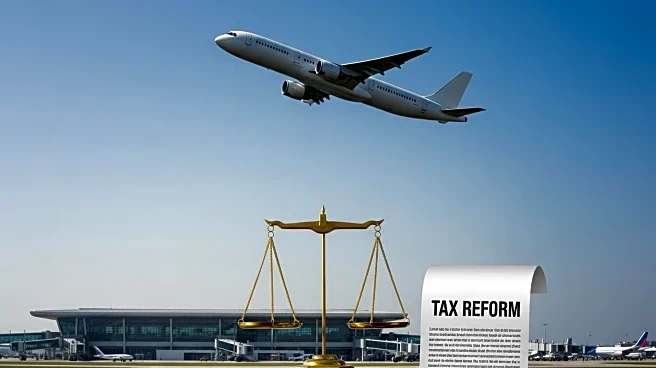What is the story about?
What's Happening?
Vienna Airport is advocating for reform of Austria's aviation tax, which it claims puts the hub at a regional disadvantage. Wizz Air is closing its five-aircraft Vienna base in two phases, citing the tax as a factor. Ryanair is also reducing its presence in Vienna, shifting capacity to Bratislava, Slovakia. The aviation tax costs €30 for short flights and €12 for longer flights, which Vienna Airport argues is a competitive disadvantage compared to neighboring countries that have abolished similar taxes. The airport plans to cut airline charges by 4% next year to boost competitiveness but calls for broader policy support.
Why It's Important?
The pullback of low-cost carriers like Wizz Air and Ryanair from Vienna Airport highlights the impact of aviation taxes on regional competitiveness. The situation underscores the need for policy alignment to support the aviation sector and maintain Vienna's status as a key hub in Europe. The airport's call for tax reform reflects broader challenges faced by airports in balancing fiscal policies with growth objectives. The outcome of this advocacy could influence future tax policies and impact the economic landscape of the region, affecting airlines, passengers, and related industries.
What's Next?
Vienna Airport is on track for record traffic despite the challenges posed by ULCC retrenchment. The airport is investing in infrastructure upgrades, including a €420 million south terminal expansion. Long-haul development is contributing to growth, with new routes to Singapore and restored flights to China. The airport remains optimistic about future capacity increases, particularly in long-haul routes to the U.S. and East Asia. The ongoing advocacy for tax reform may lead to policy changes that enhance Vienna's competitiveness and support its long-term growth strategy.
Beyond the Headlines
The situation at Vienna Airport reflects broader trends in the aviation industry, where fiscal policies and regional competition play significant roles in shaping airline strategies. The airport's experience highlights the importance of infrastructure investment and policy support in maintaining competitiveness. The call for tax reform raises questions about the balance between government revenue and industry growth, with implications for economic development and international connectivity. The airport's proactive approach to addressing these challenges serves as a model for other hubs facing similar issues.
















